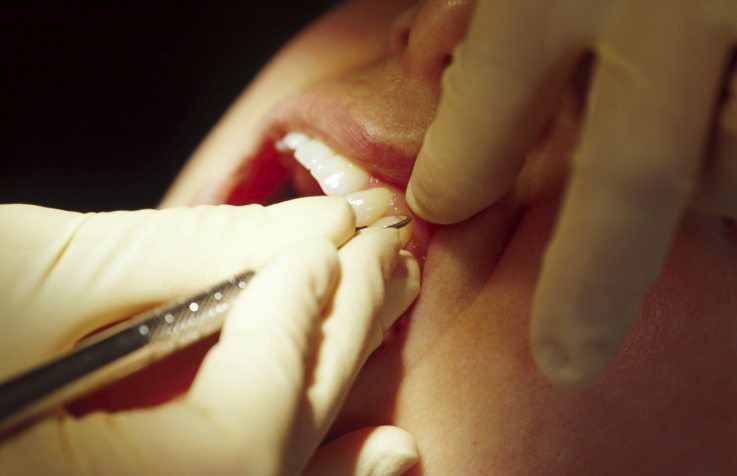Don’t Be a Plaque Enabler: Five Plaque Building Habits to Avoid

When it comes to the health of your teeth and gums, nothing presents as great a danger as plaque. A sticky biofilm of bacteria and lingering food particles, plaque feeds off the sugars you eat to produce damaging acids that erode way tooth enamel. Over time, invisible cracks form in your teeth where bacteria can begin to buildup, eventually leading to tooth decay and gum disease.
It’s because of plaque that you’ve constantly heard about the importance of brushing your teeth ever since childhood. However, despite the importance of removing plaque from teeth, many people regularly engage in bad habit that help to build plaque. To help ensure you enjoy a lifetime of quality oral health, McKinney, Texas dentist Dr. Paul Lawrence want every patient to know about five bad plaque building habits to avoid.
Bad Habit 1: Not Brushing Daily
As mentioned previously, plaque builds up on your teeth, and needs to be removed daily. When you fail to brush everyday, you allow plaque to harden into tartar, a thick layer of bacteria that can only be removed from your teeth by Dr. Lawrence. Tartar begins to accumulate along the gum line, making it harder to properly clean your teeth when brushing. This layer of bacteria can also begin to cause gum inflammation, which can eventually lead to your gums receding away from the base of your teeth. Gum recession is the number one cause of tooth loss in adults.
When you do brush, you need to make sure you do so properly. Even though the ADA recommends that a person spend at least two minutes brushing each time they pickup their brush, studies have shown that people actually brush an average of 30 seconds. This means they spend only one minute, or a quarter of the recommended time, brushing each day. To help ensure you brush for long enough, try dividing your mouth into four quadrants and spending 30 seconds cleaning each one. Since it’s easy to lose track of time, install a wall clock in your bathroom, if necessary.
Bad Habit 2: Not Flossing Daily
The other half of practicing quality oral hygiene, flossing daily helps to remove plaque from areas of your mouth brushing cannot. Plaque accumulates in the gaps between your teeth where only floss can reach. Failing to remove plaque from these areas can cause tooth decay regardless of how well you brush daily. The area in-between your teeth can also collect lingering food particles after you eat. If not removed, these particles can begin to decay, and cause you to experience frequent bad breath.
Bad Habit 3: Not Using Mouthwash
Unfortunately, the formation of plaque isn’t limited to your teeth. Plaque can buildup in areas you don’t brush, such as your tongue, gums, and cheeks. To ensure you thoroughly eliminate plaque, you need to use an antibacterial mouthwash at night after brushing. Think of it as insurance against any plaque you might have missed while brushing, and as a way of ensure the freshest breath possible.
Bad Habit 4: Avoiding the Dentist
Sometimes no matter how well you brush, you will still develop oral health problems. This can be caused by a combination of things as bad genetics, a smoking habit, or poor diet. By not visiting Dr. Lawrence regularly at McKinney Smiles, you miss out on routine cleanings that can remove any built up tartar along the gum, and oral health exams that can pickup on early signs of tooth decay. Dr. Lawrence will also perform an oral cancer screening as part of a checkup. In its early stages, oral cancer is almost undetectable by the untrained eye. If you receive an oral cancer diagnosis, the earlier you begin treatment, the better your chances of making a full recovery.
Bad Habit 5: Indulging Your Sweet Tooth
If you frequently snack throughout the day on candy bars and sweetened sodas, you’re providing harmful plaque with a smorgasbord of fuel to wreck the health of your teeth with. Your mouth produces less saliva when snacking than it does when you eat a full meal. Saliva acts as the body’s natural defense against plaque by neutralizing the acids the bacteria creates. When you eat a candy bar after lunch and don’t brush immediately after, not only do you provide plaque with food, your mouth doesn’t produce the saliva it needs to neutralize the acids plaque creates. This is why as a child you always heard that sugar will rot your teeth.
If you have any questions about the risks your teeth face, feel free to ask McKinney dentist Dr. Lawrence during your next appointment.
